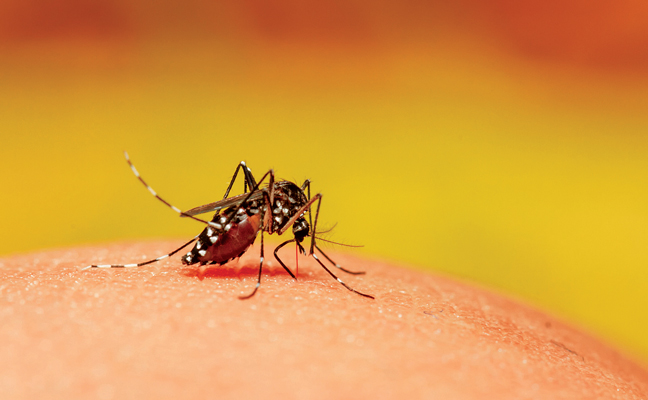
PHOTO: ISTOCK.COM/LOVESILHOUETTE
Pest management professionals (PMPs) are stewards of public health, especially when it comes to mosquito control. They protect the public from mosquito-borne viruses and diseases, including the Zika virus, West Nile virus, chikungunya, dengue, malaria, yellow fever and Eastern equine encephalitis.
Legislation was enacted on June 24 to help PMPs in their fight against disease-carrying mosquitoes, when President Donald Trump signed into law the Pandemic and All-Hazards Preparedness and Advancing Innovation Act (PAHPAI), which includes the Strengthening Mosquito Abatement for Safety and Health, or SMASH, Act.
The SMASH Act was one of five issues the National Pest Management Association (NPMA) supported during this year’s Legislative Day event, and urged attendees to discuss when meeting with their representatives on Capitol Hill. The SMASH Act specifically addresses “public health emergency due to the incidence or prevalence of a mosquito-borne disease that presents a serious public health threat,” which is why the NPMA supported the bill.
The NPMA was pleased the SMASH Act language was included in the PAHPAI, according to its VP of Public Policy, Ashley Amidon.
“NPMA members lobbied for SMASH Act passage in February as one of several public health measures the industry supported,” she says. “I know our advocates in February made an impact, and the industry was so pleased to be part of the larger coalition that helped SMASH across the finish line.”
The Pandemic and All-Hazards Preparedness Act (PAHPA) was initially signed into law by President George W. Bush in December 2006. The bill President Trump signed into law reauthorizes the PAHPA, along with the Hospital Preparedness Program (HPP), the Strategic National Stockpile (SNS) and the Biomedical Advanced Research and Development Authority (BARDA).
The PAHPAI:
- Improves the nation’s public health and medical preparedness and response capabilities for emergencies, whether deliberate, accidental or natural.
- Addresses the organization of public health emergency preparedness and response activities, via its amendment of the Public Health Service Act.
- Authorizes new programs and initiatives concerning medical surge capacity, the development of countermeasures to biological threats, and the capacity of states and localities to prepare for and respond to public health emergencies.
To help support the passage of the SMASH Act — and by extension, the PAHPAI — the NPMA partnered with the Vector-Borne Disease Network (VBDN), a group of nonprofit organizations that formed in May (of which the NPMA is a founding member) to advocate for vector-borne disease research and management funding, and connect those in the community of vector professionals.
The SMASH Act extends Centers for Disease Control and Prevention (CDC) grants for mosquito control programs to include emerging mosquito-borne diseases and to improve existing control programs.
It also requires a Government Accountability Office (GAO) report on the surveillance and control of mosquito-borne infectious diseases in the United States and its territories. The GOA study would specifically require consultation with the pest management industry on how best to control mosquito-borne infectious diseases.
“The SMASH Act was a great fit for our industry because it has language that would ask for the government to look at where vector-borne diseases will be coming from in the future — 10 or 20 years from now — and to consult with a variety of stakeholder groups to figure out the best way to deal with these oncoming concerns,” Amidon says. “The industry wants to be part of that conversation, and so we were very eager to see SMASH pass as part of PAHPAI.”
Because NPMA members protect public health, food and property, the organization supports legislation like the SMASH Act.
“While our industry has always worked tirelessly on the front lines of public health, we haven’t always talked about our services in a public health context,” Amidon says. “As part of our newly adopted Public Policy Strategic plan, we are making our voice heard more in the public health space on Capitol Hill.”
Leave A Comment